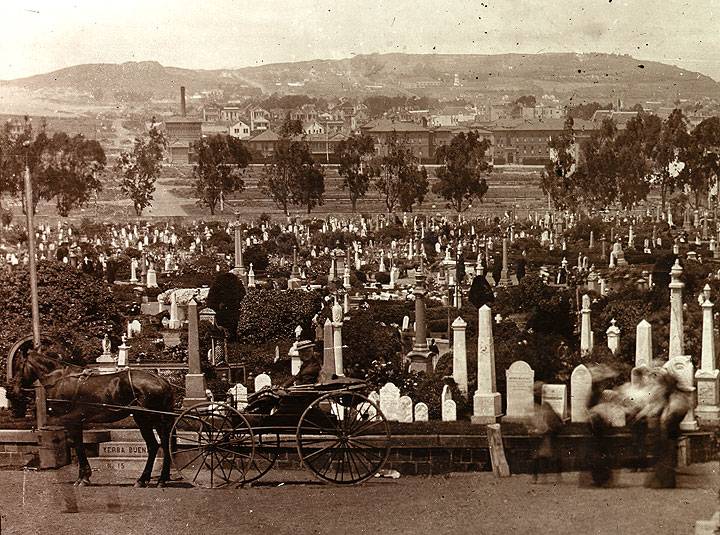Cemeteries at foot of Lone Mountain: Difference between revisions
m (1 revision(s)) |
(categories and links) |
||
| Line 2: | Line 2: | ||
'''Odd Fellows cemetery 1899''' | '''Odd Fellows cemetery 1899''' | ||
''Photo: Greg Gaar Collection, San Francisco, CA'' | |||
By the 1850s, San Francisco's growing population looked to the northwest corner for less expensive real estate on which to bury its dead. | By the 1850s, San Francisco's growing population looked to the northwest corner for less expensive real estate on which to bury its dead. | ||
[[Laurel Heights Laurel Hill]], the first of four cemeteries to be clustered around the base of Lone Mountain, was dedicated in 1854. The three soon to follow were the Calvary Cemetery in 1860 and the Masonic and Odd Fellows cemeteries in 1864. | [[Laurel Heights |Laurel Hill]], the first of four cemeteries to be clustered around the base of Lone Mountain, was dedicated in 1854. The three soon to follow were the Calvary Cemetery in 1860 and the Masonic and Odd Fellows cemeteries in 1864. | ||
The cemeteries became a popular place for Sunday family outings as the surveying for Golden Gate Park did not start until August, 1870... | The cemeteries became a popular place for Sunday family outings as the surveying for Golden Gate Park did not start until August, 1870... | ||
For years the cemeteries acted as buffers to the westward expansion of the City into the Richmond District. In 1894, J.H. Bond, the feisty editor of the [[The Richmond Banner Richmond Banner]], began to promote the removal of the cemeteries to Colma. | For years the cemeteries acted as buffers to the westward expansion of the City into the Richmond District. In 1894, J.H. Bond, the feisty editor of the [[The Richmond Banner |Richmond Banner]], began to promote the removal of the cemeteries to Colma. | ||
The Richmond was only a small "town" of three thousand at the time, whereas, east of the cemeteries, San Francisco proper had already achieved a population of over three-hundred-thousand... | The Richmond was only a small "town" of three thousand at the time, whereas, east of the cemeteries, San Francisco proper had already achieved a population of over three-hundred-thousand... | ||
| Line 15: | Line 17: | ||
The battle to remove the cemeteries to Colma followed and continued for years, with groups such as the Cemetery Defense League an Save our Cemeteries fighting the evictions. By 1914, the Board of Supervisors ordered all bodies out of the city. | The battle to remove the cemeteries to Colma followed and continued for years, with groups such as the Cemetery Defense League an Save our Cemeteries fighting the evictions. By 1914, the Board of Supervisors ordered all bodies out of the city. | ||
In the 1920s, the Masonic Cemetery was purchased as a site for the University of San Francisco and the Odd Fellows Cemetery was vacated, leaving only the green-domed [[Get Your Ashes Hauled Columbarium.]] | In the 1920s, the Masonic Cemetery was purchased as a site for the University of San Francisco and the Odd Fellows Cemetery was vacated, leaving only the green-domed [[Get Your Ashes Hauled |Columbarium.]] | ||
Calvary Cemetery was evacuated next, with housing, the Sears store and Kaiser Hospital being built on the land. | Calvary Cemetery was evacuated next, with housing, the Sears store and Kaiser Hospital being built on the land. | ||
| Line 21: | Line 23: | ||
The Laurel Hill Cemetery Association held out until 1937 when the supervisors demanded immediate evacuation... | The Laurel Hill Cemetery Association held out until 1937 when the supervisors demanded immediate evacuation... | ||
--''Renee Renaud '' in "''The Richmond Review", (Feb. 1989)'' | |||
"''The Richmond Review", (Feb. 1989)'' | |||
[[Public Transportation for Everyone |Prev. Document]] [[From the Great Sand Waste to the Richmond |Next Document]] | |||
[[ | [[category:Richmond]] [[category:cemeteries]] [[category:1930s]] [[category:1890s]] [[category:1900s]] [[category:1910s]] [[category:1920s]] | ||
Revision as of 17:38, 6 August 2008
Odd Fellows cemetery 1899
Photo: Greg Gaar Collection, San Francisco, CA
By the 1850s, San Francisco's growing population looked to the northwest corner for less expensive real estate on which to bury its dead.
Laurel Hill, the first of four cemeteries to be clustered around the base of Lone Mountain, was dedicated in 1854. The three soon to follow were the Calvary Cemetery in 1860 and the Masonic and Odd Fellows cemeteries in 1864.
The cemeteries became a popular place for Sunday family outings as the surveying for Golden Gate Park did not start until August, 1870...
For years the cemeteries acted as buffers to the westward expansion of the City into the Richmond District. In 1894, J.H. Bond, the feisty editor of the Richmond Banner, began to promote the removal of the cemeteries to Colma.
The Richmond was only a small "town" of three thousand at the time, whereas, east of the cemeteries, San Francisco proper had already achieved a population of over three-hundred-thousand...
The battle to remove the cemeteries to Colma followed and continued for years, with groups such as the Cemetery Defense League an Save our Cemeteries fighting the evictions. By 1914, the Board of Supervisors ordered all bodies out of the city.
In the 1920s, the Masonic Cemetery was purchased as a site for the University of San Francisco and the Odd Fellows Cemetery was vacated, leaving only the green-domed Columbarium.
Calvary Cemetery was evacuated next, with housing, the Sears store and Kaiser Hospital being built on the land.
The Laurel Hill Cemetery Association held out until 1937 when the supervisors demanded immediate evacuation...
--Renee Renaud in "The Richmond Review", (Feb. 1989)

